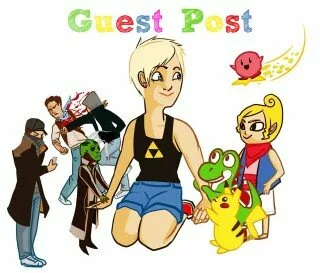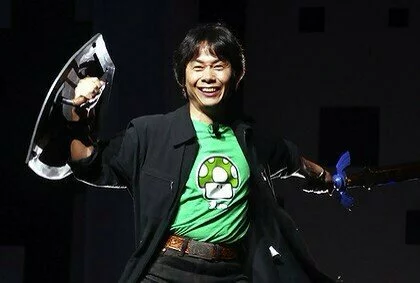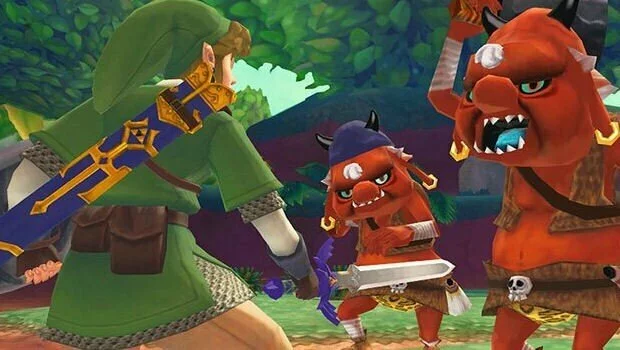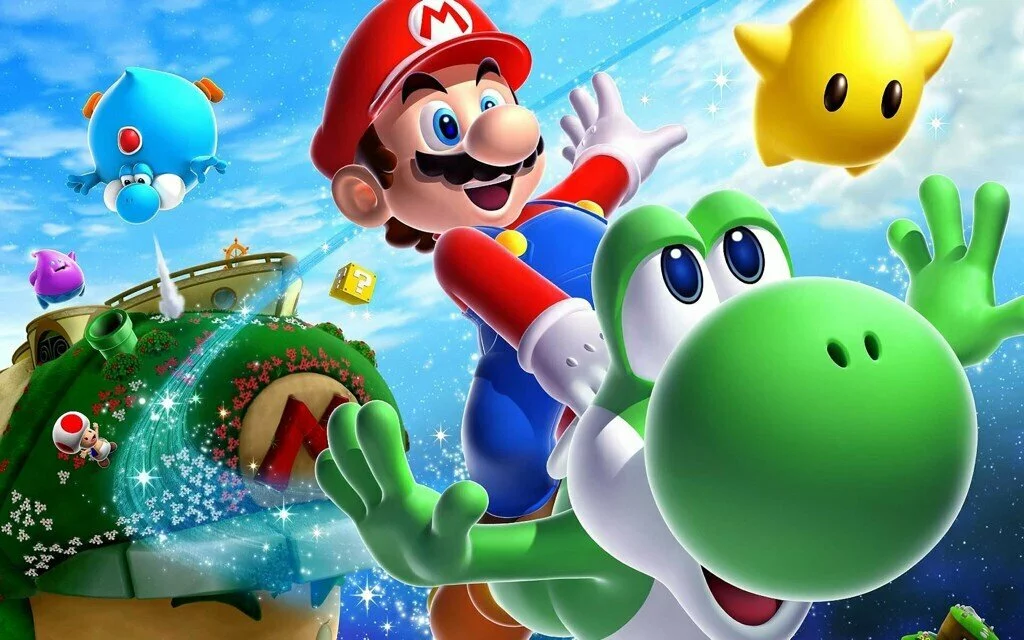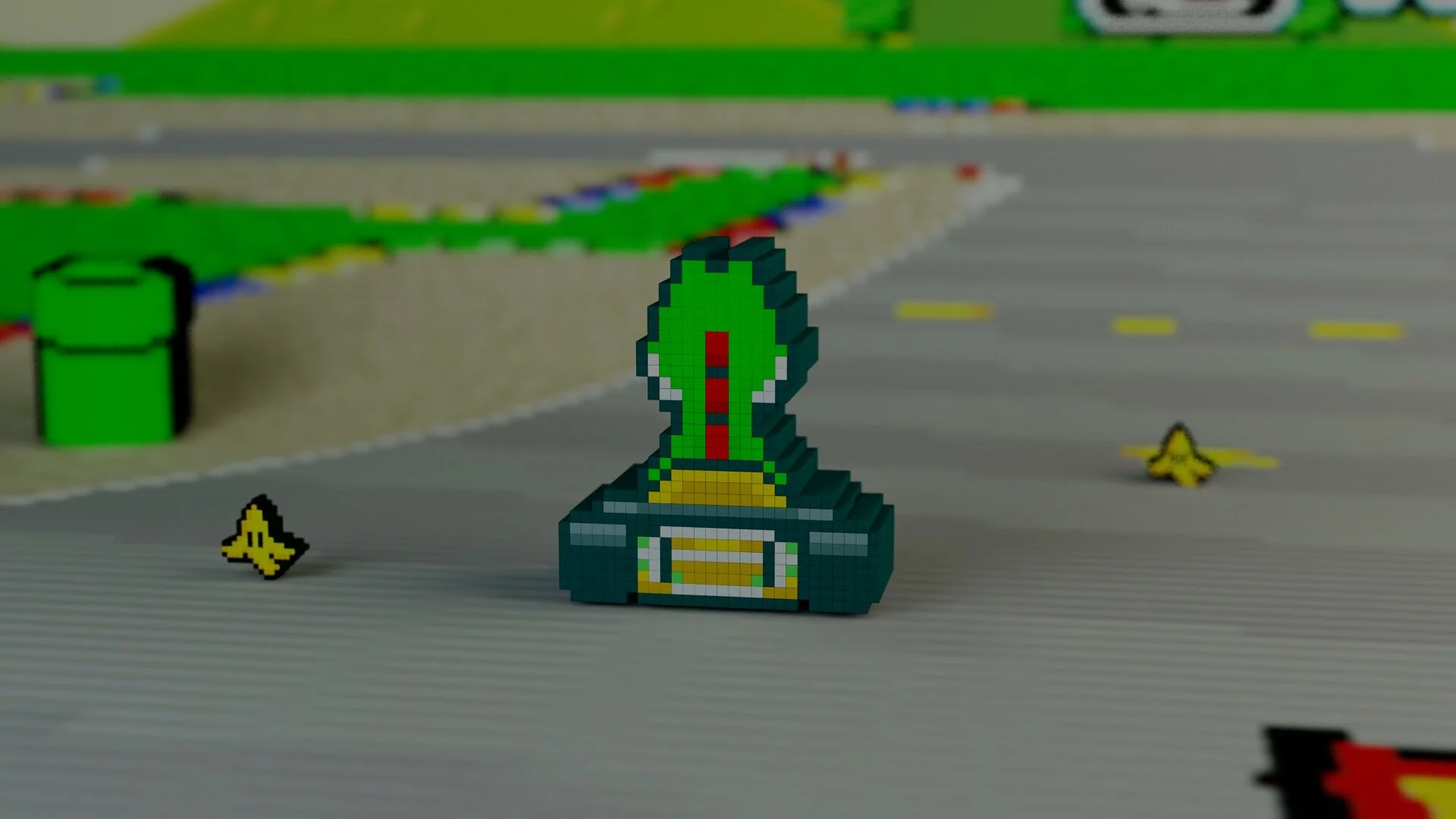By Holly Nielsen
Illustration By Faye Stacey
Nintendo means many things to many people; to some it’s reliable, polished and just down right fun, but to others it’s stuck in the past, gimmicky and too cutesy or childish. Recently I tweeted asking people why they liked/disliked Nintendo, it brought out a lot of opinions, and it seems that the video game company that perhaps produces the least controversial games are pretty divisive as a company themselves. It’s obvious that what people liked or disliked were often just different sides of the same coin, creating a bit of a dilemma; the pros and cons that people came up with were so similar it all merged into one murky grey area.
I should probably start with my own personal views on Nintendo. I have to admit I’m a huge Nintendo fan, so beware like anyone my opinions are subjective. When I was 6 or 7 years old I would play Kirby’sDreamland and Mario Land 2 for hours on my Gameboy even though I could rarely get past the third level- they were just so fun. A few years later and The Legend of Zelda opened my eyes to games with a larger scope and from then on I was hooked. If it involves a slightly effeminate man in a green hat running around smashing pots and cutting grass, you can bet I’ve played it.
E3 2014 also reminded me of a time when my brother and I would desperately try and find some way of watching the press conferences huddled over a pixelly disjointed picture and Nintendo always stood out for me for a number of reasons. Nearly all the other conferences were filled to the brim with guns, violence and grizzled men with surly voices and stubble; all washed over with a grim colour palette of grey, black with dashes of brown. Then Nintendo would come along with bright colours, fun and some much needed whimsy. How could you not love it when Miyamoto came out wielding the master sword, or when they did that skit about Reggie getting sucked into the 3DS and he came back on stage in a tattered suit- GENIUS. From a personal point of view it wasn’t just about a difference in colour palette, it was also rooted in the fact that as a young girl I wasn’t the teenage boy demographic that the other companies seemed to be desperately playing up to. Nintendo in comparison seemed accessible and welcoming to all gamers. It made me want to run up on stage and give Reggie a cuddle, and that is something I still want to do. Look out Reggie, I’m comin’ for ya.
As time goes on, the video game market as a whole is becoming slowly more inclusive, but Nintendo still creates arguably the most accessible games around. None of my friends growing up were gamers, then along came the Wii and everyone was suddenly spending hours playing Wii Sports and Mario Kart against each other, and having almost criminal amounts of fun doing so! For all the people moaning about “hard core gaming” there is no way that more people buying games and enjoying them is a bad thing. I get the feeling they’re just bitter because their Nan beat them at Wii tennis.
So this leads on to another reason why I love Nintendo, their focus on fun. Nintendo never seemed to cave into trying to be “dark and edgy”. Of course many games that are dark in tone and plot are brilliant and necessary to growth as an art form, I’m certainly not wishing the likes of The Last Of Us or Fallout away, but I can’t help but feel excessive violence and one dimensional controversial plots are also a very lazy way of attempting to stand out and look “mature”. Nintendo seemed to stick to its guns and focus on the enjoyment of the player; I didn’t want to see Mario with a cigar and machine gun mowing down mutant goombas in an unnecessary blood bath. “Maturity” has nothing to do with controversy. What makes a game “immature” is not whether it is colourful or has cute characters; it’s when it utilises controversial subject matter in a lazy attempt to be “shocking or edgy”. To me an immature game has a poor depiction of minorities and women, a shallow storyline and gratuitous and unfitting violence all in an attempt to make money.
Nowadays many adults site films such as Toy Story and Up as some of their favourites. The enormous success of Frozen among older viewers shows us that films that have family friendly plots and are aimed to be enjoyed by all ages are still appreciated and loved by adults. To me Nintendo are the Disney or Pixar of the gaming world, if you appreciate polished, well designed games focused at fun, you’ll struggle to “grow out” of Nintendo. If you criticise a Kirby or Mario game as being too childish and then go and watch Frozen three times and sing “Let It Go” at the top of your lungs, you’re going to have to own that irony to pull it off convincingly.
Of course this is all informed by the fact that Nintendo wormed their way into my heart when I was a child, but what about if you didn’t play Nintendo games as a child? Are you forever cast out of the Nintendo circle? If you don’t have the rose tinted glasses of nostalgia informing your opinions will Mario and Zelda just be completely lost to you? Well, for a lot of people the answer is yes. This is where the “same coin different sides” comes in; a lot of those who had Nintendo growing up see them as reliable while those who don’t have the nostalgia for old games just see them as repetitive. Neither view is correct or wrong, because a debate between the two is completely pointless as they’re pretty much just saying the same thing. I personally don’t see them as repetitive but what I see as differences may just be seen as a difference in window dressing to another, and I can appreciate that. Although I will go out on a limb and say that if someone says the Legend of Zelda games are repetitive they have not played many Legend of Zelda games.
This club of nostalgia is also helped along by the exclusivity of Nintendo games to their own consoles; if you’re sceptical in the first place you’re not going to buy a whole new console for games you may or may not like. The consoles themselves are a divisive force among gamers, some see them as innovative for breaking the usual mould and others see them as gimmicky. However, I will just say that sometimes the games don’t utilise the mechanics that the unique consoles give them, thus making the console look gimmicky. There. I said it. Please don’t strike me down Miyamoto.
Now just because I will put my hand up and whole-heartedly admit that I am very much part of the Nintendo nostalgia society does not mean that I am blind to all its faults. Nintendo is often a difficult company to love. The confusing embargoes and the Tomodachi Life same-sex relationship debacle are just two examples of when Nintendo gets it wrong, it is not the angelic and benevolent giver of games that some people perhaps get a bit carried away and think it is. It is a business like all games companies, money and profits are always a force.
It’s a company that seems to attract undying adoration blind to faults, dismissal that often comes down to not having tried it and debates arguing the same thing but using a different word. I love Nintendo. I will always argue that you will struggle to find a more consistent developer focused on fun, but I can also see where a lot of people are coming from with their criticism, because they are essentially just a negative way of saying why I love it. The reasons why people love are the reasons why people hate and vice versa, something perhaps exclusive to Nintendo as a developer. I will however encourage those Nintendo sceptics out there to maybe go to a friend’s house, play some Mario Galaxy or one of the Zelda titles and try to look past the colours and the console, clear your mind of any preconceptions, let go, and just have fun. If it’s still not to your taste then fair enough. (Though I will have to drop-kick you if you say every Zelda game is the same, you have been warned.)
You can find more of Holly’s work here.
More of Faye’s artwork can be found here.
